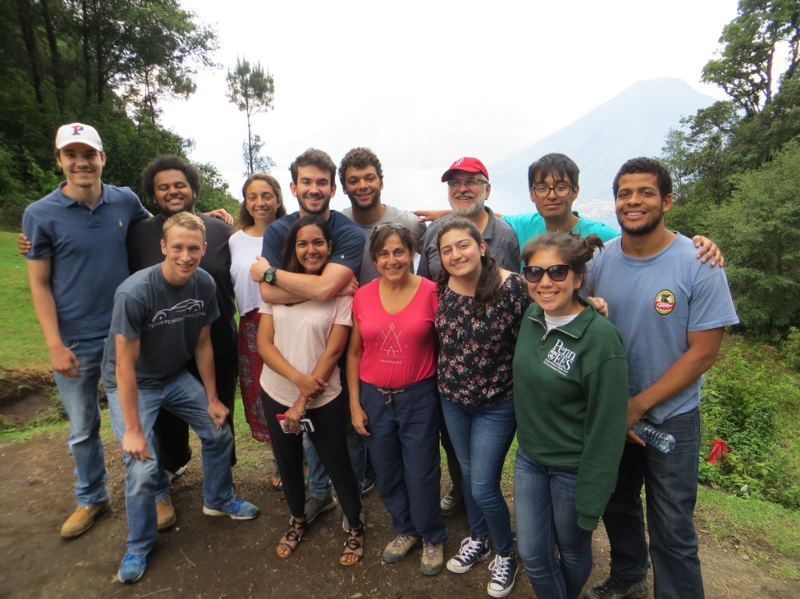Sarah Pasquale: Engineers Without Borders’ Concrete Lessons

Sarah Pasquale, a junior majoring in Mechanical Engineering and Applied Mechanics, recently traveled to Guatemala as part of the University of Pennsylvania chapter of Engineers Without Borders (PennEWB). Wanting to use engineering principles to help others and take a hands-on, out of the classroom approach to engineering, Pasquale saw the summer trip as a perfect way to see engineering work firsthand for the benefit of others.
As a freshman, Pasquale applied to be a member of the PennEWB’s international trip during the summer of 2017, which was phase four of PennEWB’s project in Guatemala. This summer, Pasquale acted as one of the two student trip leaders for the final implementation of the project. PennEWB’s program has now completed sanitation, health and hygiene projects in Tzununa, a rural village on Lake Atitlán.
I made many choices my freshman year, some of which were iffy and uninformed. At the time, one of those decisions was applying to the international trip to Guatemala Penn’s chapter of Engineers Without Borders. It was iffy in the sense that I was a freshman who knew nothing about engineering, was at best “rusty” with Spanish, and had never traveled overseas without my family. But for some unexplainable reason, my timid, nervous-as-hell first-semester freshman self filled that application out, on the off-chance that the reviewers would overlook all of that.
I look back now as a junior and thank that past version of me.
Fast-forward to May 2018, when I set back off to Guatemala with a group of ten undergraduate students of various majors, one graduate mentor, and two faculty-members-turned-EWB mentors: J. Anthony Sauder of the Applied Geosciences Program and Maria-Antonia Andrews, the Associate Director of Undergraduate Programs in the Department of Earth and Environmental Science, both from the College of Arts & Sciences.
All of the students were enrolled in an engineering class, taught by Sauder and Andrews, where we learned more about our mission: to build latrines for a rural village in Guatemala. I was no longer the timid freshman — I had already experienced this trip to the same rural village, Tzununa, and now was one of the student trip leaders.

As such, I had anticipated what was going to happen throughout our experience. I knew we would spend time living with a family, mix concrete and work beside the local masons to build latrines, travel to different villages on Lake Atitlán, shop and be tourist-y for some days, and learn more about the Maya culture. I knew we would bond together as a team after days of working in the sun, going on the traditional hike up the mountain, playing card games, and swimming in the lake itself, all while being cut off from cell service and the internet. However, my forward thinking could not prepare me for how different this second time around was, and how it changed me for the better.
I learned many things in that first trip to Guatemala as a freshman. I learned the correct ratios of materials to make concrete, I learned that my Spanish was better when the words were song lyrics, I learned that soccer is a way of communication when language fails you, and I learned that communication is more meaningful when your phone is turned off. I saw firsthand families that were grateful for our work in helping them have a sanitary method of going to the bathroom, something that we, in America, take for granted every single day. I saw how just a little bit of work can lead to monumental change: how a single phase of latrine implementation can spread to grow into a whole project that changes the habits of an entire community. I learned from the work — how physical labor working hand-in-hand with others gives one the ability to feel accomplished from the sight of seeing progress in person.
On this summer’s trip, I did not learn from the physical work as much as I did from the people. I learned from my fellow teammates, who all came together as a close-knit group. Together we learned about each other’s beliefs, faiths, families and cultures. We had one another’s backs on the hike, on work sites, and demonstrated to the community that women and men can work effectively together. As a leader I had the privilege of seeing the group form friendships with each other and with the people in the community, and see their perspectives change throughout the trip. I got to see a replay of how the trip affected me that first time as it happened to others.
I also learned that you do not need that much time to form strong relationships with people, and that kindness is a language that everyone understands. During our trip, one of our local contacts’ father passed away in a car accident and we went to the funeral to pay our respects to the family. The entire group had bonded with our local contact and was deeply saddened to see a man always so happy and cheerful with us grieving. It put into perspective how close we had become with him and the rest of the people we worked closely with, and how we could care so much for people that we had known for only two weeks.
These trips truly changed how I see the potential of engineers. Engineers don’t have to go on and build the “next big thing” or create the next billion-dollar startup. Engineers can form partnerships with people who need help in attaining some of the most basic necessities, like latrines, potable water, and infrastructure. Not only does this help make a difference for them, but it opens your mind to more than just your small corner of the world.

